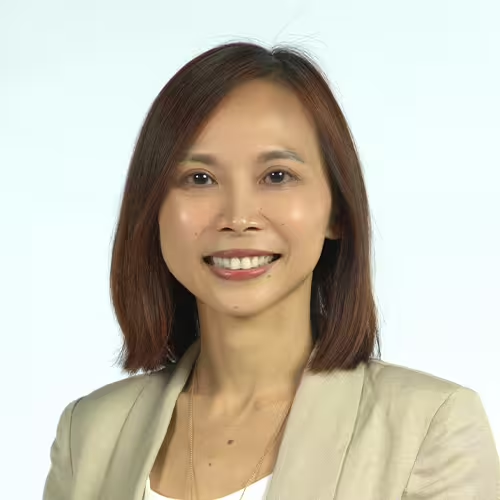
Merging Finance Business Finance and Business for ESG Integration
Peisan is Head of Cost Transformation at ofi (olam food ingredients), bringing over 20 years of expertise to her role. Her personal motivation to have an impact beyond traditional finance got her involved in Accounting for Sustainability (A4S) Program, where she developed practical methods to operationalize sustainability into the company’s decision processes.
About ofi (olam food ingredients)
ofi (olam food ingredients) offers sustainable, natural, value-added food products and ingredients so that consumers can enjoy the healthy and indulgent products they love. It consists of industry-leading businesses of cocoa, coffee, dairy, nuts, and spices. ofi has built a unique global value chain presence including its own farming operations, farm-gate origination, and manufacturing facilities.
Sector: Food & Ingredients
Employees: 18’000
Geography: Headquarters in London and Singapore, operating globally
Website: www.ofi.com
Challenges
faced
In 2023, Peisan along with the Finance for Sustainability (F4S) team led a company-wide project aimed at integrating Social and Environmental factors into Capex investment decision making through a standardized risk framework. Despite Peisan’s extensive background in finance, she faced several challenges in her endeavour.
Embedding sustainability into the capex processes was a novel concept within the organization. Traditionally, capex investments were assessed primarily from a financial perspective, with a separate Environmental & Social Impact Assessment done to cover the Environmental & Social aspects. This highlighted the need for a structured and comprehensive approach to integrate environmental, social, and governance (ESG) considerations into investment evaluation criteria.
One of the primary challenges was designing a framework for capex investments from a sustainability perspective that balanced comprehensiveness and practicality. The framework needed to be accessible to non-experts, avoiding technical jargon while remaining comprehensive enough to be meaningful. This balance was crucial to ensure the framework was widely adopted rather than seen as an impediment to progress.
Actions
taken
Peisan’s initiatives exemplify how small, consistent steps can create meaningful change.
She began by engaging in detailed discussions with the Head of F4S (finance for sustainability) to identify key process gaps and aligned on the integration of ESG considerations into the capex process as priority. Together, they worked to identify the existing gaps in assessing capex investments from a sustainability perspective. The assessment was presented to the Global CFO to gain his support and alignment with his vision and perspectives.
Peisan then developed a structured framework to include the material Sustainability topics as well as ensuring overall alignment with the ofi Sustainability strategy Choices for Change, and support for the company’s 2030 sustainability targets. The framework considered key sustainability areas such as carbon emissions assessment (scope 1&2), deforestation, and water consumption, and categorized the associated risk profiles as low, medium, or high. This structured approach ensured that sustainability impacts were systematically assessed for all capex investments.
The new framework was made accessible through a simple scoring system. This system allowed non-experts to intuitively assess sustainability risks, making the process more approachable. The scoring system was supported by a risk database, developed with input from subject matter experts, to provide objective assessments of different risk areas.
Peisan engaged many colleagues and departments across the organization, going through several rounds of iterations and pilot projects to ensure the framework was practical and relevant to all users.
Resonance
of impact
Peisan is contributing to a greater awareness and culture of sustainability; helping to ensure that sustainability impacts were systematically assessed for all major investments. This new practice is helping the organization make more informed and responsible investment decisions and supports ofi’s purpose to ‘Be the change for good food and a healthy future’.
The structured framework and simple scoring system have made sustainability concepts accessible to everyone in the company. This inclusivity – of sustainability, encouraging employees from various backgrounds to consider ESG impacts in their decision-making processes.
Peisan validated the framework through pilot projects, such as applying it to a Greenfield Investment Project. By involving different teams, she ensured the framework’s outputs were relevant, highlighting key sustainability risks. Continuous iterations, including refining risk criteria based on feedback, have kept the framework adaptable. For example, adjustments were made to align with the European Union Deforestation Regulation (EUDR).
The iterative approach, supported by extensive collaboration with teams, has ensured the framework is practical, widely accepted. The final framework has been rolled-out and embedded into business-as-usual processes. Following the ‘stabilization period,’ which is estimated to take about one year, Peisan and her team plan to elevate the decision-making in the next phase.
Peisan’s efforts have also helped to raise awareness of how every aspect of the organization can contribute to sustainability impacts. Sustainability is a strategic priority for ofi and has long been embedded in the heart of its operations, and now sustainability is becoming integral to finance decision-making for capex projects.
Looking ahead, Peisan aims to further build upon the capex framework, adapting it to new learnings and feedback. By making it even more effective at embedding ESG into organizational processes,she is helping to ensure sustainability considerations are even more deeply rooted into ofi’s decision-making. This ongoing refinement will help the framework fit the practical needs of the teams using it, solidifying its impact on the company’s operations.